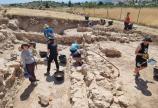Unearthing students’ passions for experiential learning
- Nicole Pointon

In the spring of 2022, two years and one pandemic after a previous semester studying abroad, Sally Martin-Damman was eager to get back to Greece. A six-week immersive field school at Eleon—an ancient site in the village of Arma—beckoned her.
When she started out at UVic, Martin-Damman had planned on pursuing a teaching degree with a minor in French. Then, in 2019, Greek and Roman Studies Professor Brendan Burke visited one of her classes, encouraging students to take part in a Semester in Greece program. Martin-Damman decided to go for it.
“It was sort of on a whim,” says Martin-Damman. “But the semester studying in Greece totally changed my life.”
Returning to Greece this year to take part in the Eastern Boeotia Archeological Project not only required patience—with the pandemic putting field schools on hold—and planning, but also a lot of saving to cover the costs of the experience. She saved money from summer jobs and working part time during the school year, but when this was not enough, she also applied for financial awards like the Elias Mandel Prize for Study Abroad, an endowed fund available to Faculty of Humanities students for travel-based or experiential study.
“I would not have been able to afford this opportunity without receiving funding from UVic,” says Martin-Damman, with no hint of exaggeration.
Professor Trevor Van Damme, who recently took over the leadership of the Eastern Boeotia field school from Burke, emphasizes that donor support for student travel awards, as well as philanthropic infusions towards field schools directly, can significantly lower barriers to participation.
“The main barrier is the cost associated with the program in terms of student tuition, travel expenses and lost summer job revenue as well as the program fees, which are dependent on the cost of housing, food and transportation during the six-week period in Greece,” says Van Damme. He also notes that this year has been particularly costly due to increased energy costs and inflation.
Experiential learning opportunities offered by the Department of Greek and Roman Studies include the Semester in Greece, the Eastern Boeotia Archaeological Project and an archaeological program at Ilduro in Catalonia, Spain, led by Professor Alejandro Sinner. These are a few among many Faculty of Humanities field schools that are challenged by inflation and rising costs of travel.
“Even with carried-over travel funds accumulated when field schools were not operating during the pandemic, we are still deluged with requests for financial support from our students,” says Lisa Surridge, humanities associate dean academic. “It is clear that we will require at least a tripling of support funds to be able to meet student demand.”
Martin-Damman can attest to the power of the hands-on experience gained while studying abroad. The Eastern Boeotia Archaeological Project at Eleon provided experiences documenting a previously unknown fortification wall, washing and iden- tifying pottery, working with GIS, photographing artifacts and data management—all skills transferrable to Martin-Damman’s studies back in Canada.
“I’ve taken so many courses about archeological methods and theory as well as classes about Ancient Greece, but this is the first time I’ve been able to put what I’ve learned in the classroom into practice like this!” she says.

